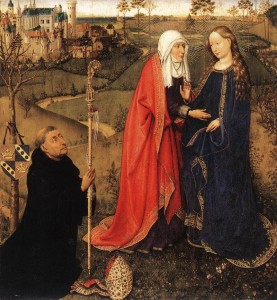Thoughts on Today’s Lessons for Dec. 20, 2015

“Visitation”, from Altarpiece of the Virgin (St Vaast Altarpiece) by Jacques Daret, c. 1435 (Staatliche Museen, Berlin)
Micah, one of the early prophets, wrote this beautiful short book in poetic form some 700 years before Christ. Recalling the defeat of the northern Kingdom, Israel, by the Assyrians, Micah writes to the people of Jerusalem in Judah. foretelling that a new ruler who will come from the village of Bethlehem – which had given birth to King David. In words that we may recognize from their use in Handel’s Messiah, we hear that the new ruler will unite them as a shepherd leads his flock, all under God’s protection in peace.
In place of a Psalm today we have a Canticle, the verses of Luke’s Gospel that Mary sang when she visited her sister Elizabeth while the two women were both pregnant with Jesus and John. (We will hear the verses that come just before this song in today’s Gospel.) This song, called the Song of Mary or the Magnificat, celebrates a powerful and merciful God who protects the weak and the oppressed: A God who practices the righteous justice that brings good news to the poor. Now, for a fascinating bible study experience, turn to 1 Samuel 2:1-10 to read a similar response from another woman, Hannah, who gave birth to a God-given son, Samuel, who prepared the way for Israel’s first kings.
Second Reading: Hebrews 10:5-10
Here’s another snippet from Hebrews, the letter that we went through for several weeks in our Second Readings this past autumn. Consistent with its theme of contrasting Jewish Christianity against Temple Judaism, it echoes prophecies of Isaiah and Amos, who warned of a God who “takes no pleasure” in temple sacrifices. Instead, it proposes that God’s promise to Israel at Sinai has been fulfilled in Jesus’ Incarnation and sacrifice.
Gospel: Luke 1:39-45
Here is the first part of Luke’s account of Mary’s visit to her cousin Elizabeth. Both women are pregnant – Elizabeth with John, Mary with Jesus – both visited by angels with the news that they would give birth in spite of the seemingly insurmountable obstacles of Elizabeth’s old age and Mary’s status as a virgin. When the women meet, Elizabeth feels John leap in her womb, and Mary bursts into the Magnificat, the song we hear in today’s Canticle.
